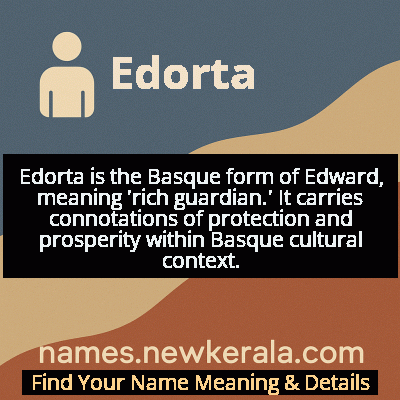Edorta Name Meaning & Details
Origin, Popularity, Numerology Analysis & Name Meaning of Edorta
Discover the origin, meaning, and cultural significance of the name EDORTA. Delve into its historical roots and explore the lasting impact it has had on communities and traditions.
Name
Edorta
Gender
Male
Origin
Basque
Lucky Number
9
Meaning of the Name - Edorta
Edorta is the Basque form of Edward, meaning 'rich guardian.' It carries connotations of protection and prosperity within Basque cultural context.
Edorta - Complete Numerology Analysis
Your Numerology Number
Based on Pythagorean Numerology System
Ruling Planet
Mars
Positive Nature
Generous, passionate, energetic, and humanitarian.
Negative Traits
Impulsive, impatient, moody, and can be overly emotional.
Lucky Colours
Red, maroon, scarlet.
Lucky Days
Tuesday.
Lucky Stones
Red coral, garnet.
Harmony Numbers
1, 2, 3, 6.
Best Suited Professions
Military, sports, philanthropy, leadership roles.
What People Like About You
Courage, energy, leadership, generosity.
Famous People Named Edorta
Edorta Jimenez
Writer and Journalist
Renowned Basque author and columnist known for his works on Basque culture and society
Edorta Madariaga
Chef
Celebrated Basque chef who has promoted traditional Basque cuisine internationally
Edorta Otaegi
Musician
Influential Basque folk musician and composer preserving traditional Basque musical heritage
Edorta Larizgoitia
Athlete
Prominent Basque pelota player who competed at international levels
Name Variations & International Equivalents
Click on blue names to explore their detailed meanings. Gray names with will be available soon.
Cultural & Historical Significance
The name also reflects the Basque people's relationship with concepts of protection and guardianship, which have been central to Basque society's survival through centuries of political and cultural challenges. In contemporary Basque culture, Edorta embodies the balance between embracing global connections and preserving local traditions. It represents the modern Basque identity that is both rooted in ancient heritage and engaged with the wider world, making it a name that carries both historical depth and contemporary relevance in the ongoing story of Basque cultural preservation.
Extended Personality Analysis
Men named Edorta are typically characterized by a strong sense of duty and protective instincts that align with their name's meaning of 'rich guardian.' They often exhibit natural leadership qualities combined with practical wisdom, making them reliable figures in both family and professional settings. Their personality tends to blend traditional values with modern adaptability, reflecting the Basque cultural emphasis on balancing heritage with progress. Edortas are generally perceived as steady, thoughtful individuals who approach life with both caution and determination.
These individuals often demonstrate exceptional loyalty to their community and cultural roots, frequently taking on roles that involve preserving traditions or supporting collective wellbeing. Their protective nature extends beyond physical safety to include emotional support and cultural stewardship. Edortas typically possess a quiet confidence and resilience that enables them to navigate challenges while maintaining their principles. They are often respected for their integrity and commitment to their responsibilities, whether in personal relationships, professional endeavors, or community involvement. The combination of these traits makes Edortas natural pillars in their social circles, embodying the guardian spirit inherent in their name.
Modern Usage & Popularity
In contemporary usage, Edorta maintains a stable presence primarily within the Basque Country and among Basque diaspora communities, though it ranks outside the most popular names. Its usage represents a deliberate choice by parents seeking to honor Basque linguistic heritage while selecting a name with recognizable international equivalents. The name has experienced a modest revival as part of broader efforts to preserve and promote the Basque language and cultural identity. While not experiencing dramatic popularity surges, it maintains cultural relevance and is frequently chosen by families with strong connections to Basque traditions. Its usage is more concentrated in areas with active Basque language promotion and among families engaged in cultural preservation activities, though it appears consistently across all Basque-speaking regions as a traditional yet accessible naming option.
Symbolic & Spiritual Meanings
Symbolically, Edorta represents the profound concept of guardianship that extends beyond individual protection to encompass cultural preservation and heritage stewardship. The name embodies the metaphorical role of the Basque people as custodians of their unique language, traditions, and identity in an increasingly globalized world. It symbolizes the delicate balance between wealth—understood as cultural richness and community prosperity rather than material accumulation—and the protective responsibility that such wealth necessitates. Edorta carries connotations of stability, reliability, and cultural continuity, making it a powerful symbolic choice that reflects the enduring nature of cultural identity across generations. The name suggests that true prosperity emerges from safeguarding one's heritage and community, positioning its bearers as links in the chain of cultural transmission and preservation.

